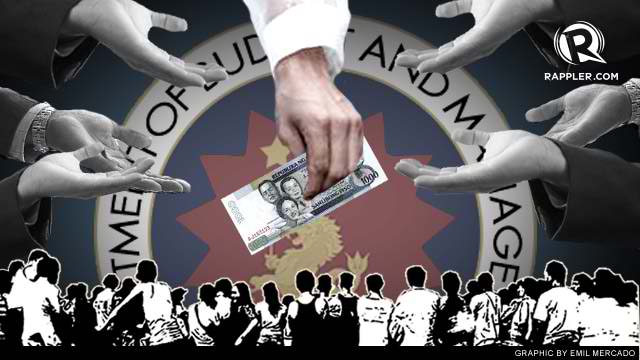SUMMARY
This is AI generated summarization, which may have errors. For context, always refer to the full article.

MANILA, Philippines – The present administration commits to give poverty reduction priority in the 2014 budget.
But some civil society organizations (CSOs) are unsure that the recent initiative by the Department of Budget and Management (DBM) will make this possible.
Budget Secretary Florencio Abad said the 2014 budget will focus on programs that will directly and substantially benefit the poor by following the bottom-up-budget (BUB) approach. This was initiated in 2013 and involved 1,233 local government units, identified as the poorest in the country. They were tapped to partner with CSOs and local communities in drafting their projects and programs.
BUB aims to ensure that budget preparation and allocation will target areas where poverty reduction is urgent and necessary.
Without due consent
In the municipality of Dolores in Eastern Samar, however, no trace of a proposal drafted by the LGU and the local community was seen in the final draft submitted to the DBM Regional Poverty Reduction Action Team (RPRAP) technical review panel. This panel is chaired by the Department of the Interior and Local Government (DILG).
More than 50% or P8.5 million of the P15-million budget allocated to the municipality was instead used for farm-to-market roads which, according to the Regional Poverty Reduction Action Team (RPRAT) representative Ian Mosquisa, was not included in the original draft.
Mosquisa explained that changes in the draft endorsed by the municipal PRAT were made at the regional level. The RPRAT, chaired by the DILG regional office, validates and consolidates proposals with the different representatives of national agencies involved in the process.
The revised draft was endorsed to the RPRAT by the local chief executive, LGU staff and signatories from 3 civil society organizations selected by the local Poverty Reduction Action Team.
Unclear guidelines
According to Mosquisa, the proposal should have been returned, discussed and endorsed by the local PRAT which is composed of all CSO representatives and the LGU participants.
The invitees from civil society organizations during the regional level technical review were not selected to represent the group in the LPRAT to negotiate for possible changes. Instead they merely signed in behalf of the local PRAT-civil society organizations.
Thus, it is incumbent for them to discuss any changes before a collective decision is made.
In addition, the joint memorandum circular no. 3 circulated by NAPC-DBM-DILG-DSWD is also unclear about the process for identifying CSO representatives who will sign and agree to amendments.
Mosquisa however clarified that DILG Undersecretary Francisco “Bimbo” Fernandez was very apologetic upon learning about the incident.
Time and procedural fine-tuning
Time, according to Mosquisa, is of the essence. Pressed for time, it is possible that the local teams had difficulty convening all CSOs for the amended drafts.
In addition, Mosquisa believes that guidelines set jointly by the National Anti-Poverty Commission, budget department, DILG and DSWD need fine-tuning. Details, such as the process for approval of amendments, must be specific and transparent.
The present administration targets P2.27 trillion for the 2014 budget, 13.1% higher than the P2.01 trillion 2013 budget.
According to DBM, “The 2014 expenditures program would ensure that key agencies coordinate their targets and activities to facilitate program execution and push down convergence programs to the geographical sites where the poor, unemployed and underemployed reside.”
For Mosquisa, the challenge for the 2015 budget preparation lies in getting the trust and cooperation of the local communities.
“When we asked them to engage, for them to join, the CSOs trusted us. Paano pagbalik namin? Ibabalik nila sa amin bakit wala yung proposed projects last year or nandiyan pero maliit ang budget?”
(What happens when we go back next year? The community will demand an explanation why their proposals were not reflected, or if it were, the allocation has been reduced.) – with a report from Raisa Serafica/Rappler.com
Add a comment
How does this make you feel?
There are no comments yet. Add your comment to start the conversation.